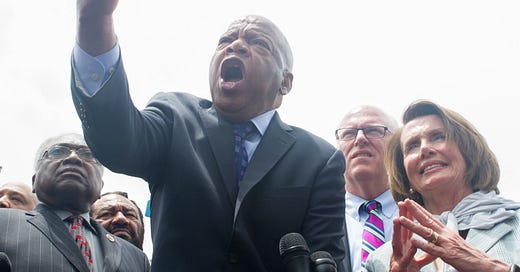A Nation at the Crossroads
“Don’t give up, don’t give in, don’t give out. Don’t get lost in a sea of despair.” --Rep. John Lewis
By Brenda Jones
As we reflect on the 60th Anniversary of the Selma-to-Montgomery marches, our nation stands at the crossroads. "Another generation used what they had," the late Rep. John Lewis would say, "and they had themselves, so they put their bodies on the line for the cause of simple justice in America.” Tyranny did not prevail then, and it will not prevail today, especially with all the resources we have at our disposal. We must know that justice has had and always will have the final say. This was the faith of Selma.
In 1965, it was illegal for black and white people to sit next to each other on a city bus or stay in the same hotel. Black men could be arrested and taken to jail for having a conversation on the street with more than one or two of their friends or for sitting down at a lunch counter in an integrated fashion. People were fired from their jobs or run off their farms in this country for simply attempting to register to vote.
This system of legalized segregation and racial discrimination had been in place for almost 100 years when John Lewis and his band of Civil Rights Movement brothers and sisters began protesting in Selma. But in a few short years, by the time they were done, segregation had fallen and a new order was the way of life in an America we still live in today.
There are forces who want to take us back, but we must remain determined that we are not going to go back. Selma immortalizes the power of people, even the least among us, to overcome oppression. By marching, they were invoking a higher law grounded in non-violent action. Selma was the ultimate application of a long-standing African American tactic, which was brought to the wider public’s attention most recently by Michelle Obama: “They go low, we go high.” This strategy was based not merely on individual commitment, but collective action.
Selma was more than protest. It was carefully planned strategic engagement involving lawyers, lobbyists, organized labor, advocacy, non-violence training, mass meetings, philosophical debate, litigation, consensus building, grassroots operations, freedom songs, legislation, incarceration, medical response units, freedom schools, moral and religious persuasion, media planning, and a host of civil rights organizations operating in concert, and at times against each other, to gain a unified result. Marching alone would never have led us to the passage of the Voting Rights Act, the groundbreaking aftermath of the Selma marches.
If Rep. John Lewis were here today, he would be encouraging us “to stand up, speak up, and speak out” against injustice. He would be reminding us that silence is compliance. He would be asserting that the Constitution begins with the words “We the people,” and that all the power of government is granted first by said people. We may decide to move in one direction, but if we find our trust betrayed, we can change course in an organized, non-violent fashion.
If Rep. Lewis were here today, he would say “Don’t give up, don’t give in, don’t give out. Don’t get lost in a sea of despair.” Another generation before us faced armed conflict brandishing their faith that “Truth pressed to earth would always rise again.” They changed America for the better. Now, it is our turn to heed the call of the “spirit of history.”
If John Lewis had never had adversaries, we might not have discovered how brave he actually was. We must use Selma and all our most inspired civil rights history to find the courage to do what we must do today. No one can do it for us. We must do it ourselves.
We must admit we have taken for granted one of the greatest gifts we could have ever been given: a nation founded not on birthright or the spoils of war, but around ideas of equality, freedom, and justice. We must admit that we have foolishly believed that government is our enemy, when government is us.
We also must realize that the persistent, quiet public service administered by the federal government, without partisanship or fanfare, is the very foundation of the American way. Dismantling it is not in our best interest; making it serve the many more capably and not just the few would be its highest manifestation.
As it was in Selma, in Concord, and Appomattox, (to allude to President Johnson’s famous voting rights speech), it is our mandate today to do our part to ensure that equality, freedom, and justice remain the flagship of America, despite the challenge of our generation. We must act responsibly but effectively to meet this threat of destruction with a new wind of faith that lifts the wings of our democracy.
We must be inspired by the history of those who gave all they had to establish what we now know to be the United States of America. Some gave a little blood, and some gave all they had. Now it is our turn to make sure that Rep. Lewis and countless others did not live and die in vain.
As President Lincoln said at Gettysburg to a nation divided against itself, we must find in our hearts “a new birth of freedom,” which is the calling of every American: to make sure that on our watch, “the government of the people, by the people and for the people [does] not perish from the earth,” but remains a beacon of hope to our children and our children's children—today, and for centuries to come.
Brenda Jones is the former speechwriter for the late Rep. John Lewis





Thank you, Ms. Jones. Your words encourage me to take heart and take action. ♥️💪
This is a beautiful and true piece. Thank you.